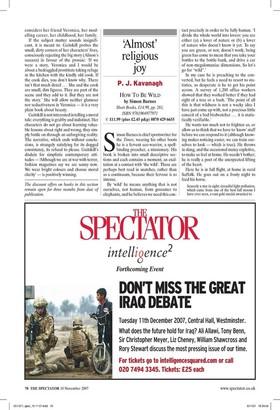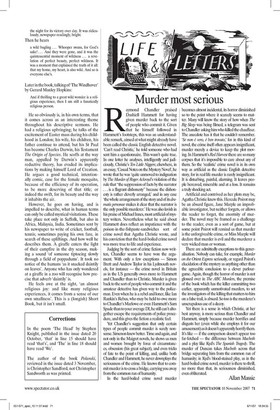Almost' religious joy
P. J. Kavanagh How To BE WILD by Simon Barnes Short Books, £14.99, pp. 281, ISBN 9781904977971 £11.99 (plus £2.45 p&p) 0870 429 6655 Simon Barnes is chief sportswriter for the Times; wearing his other boots he is a fervent eco-warrior, a spellbinding preacher, a missionary. His book is broken into small descriptive sections and each contains a moment, an exaltation at a contact with 'the wild'. These are perhaps best read in snatches, rather than as a continuum, because their fervour is so intense.
By 'wild' he means anything that is not ourselves, not human, from gossamer to elephants, and he believes we need this contact precisely in order to be fully human. 'I divide the whole world into lovers: you are either (a) a lover of nature or (b) a lover of nature who doesn't know it yet. To say you are green, or not, doesn't work; being green has come to mean that you take your bottles to the bottle-bank, and drive a car of non-megalomaniac dimensions. So let's go for "wild".'
In my case he is preaching to the converted, but he feels a need to resort to statistics, so desperate is he to get his point across. A survey of 1,200 office workers showed that they worked better if they had sight of a tree or a bush. 'The point of all this is that wildness is not a wacky idea I have just come up with, not a precious little conceit of a bad birdwatcher ... it is statistically verifiable.'
He wants too much not to frighten us, or allow us to think that we have to 'know' stuff before we can respond to it (although knowing makes noticing easier, we can train ourselves to look — which is true). He throws in slang, and the occasional matey expletive, to make us feel at home. He needn't bother; he is really a poet of the unexpected lifting of the heart.
Here he is in full flight, at home in rural Suffolk. He goes out on a frosty night to feed his horse.
Scarcely a star in sight; dreadful light-pollution, which came from one of the best full moons I have ever seen, a vast gold medal awarded to the night for its victory over day. It was ridiculously, newspaper-readingly, bright. Then he hears a wild bugling ... Whooper swans, for God's sake! ... And they were gone, and it was the quintessential moment of wildness ... a revelation of perfect beauty, perfect wildness. It was a moment that explained the truth of it all: that my home, my heart, is also wild. And so is everyone else's.
Later in the book, talking of 'The Windhover' by Gerard Manley Hopkins: And if thrilling to a great wild wonder is a religious experience, then I am still a fanatically religious person.
He so obviously is, in his own terms, that it comes across as an interesting theme throughout his descriptive sermons. He had a religious upbringing; he talks of the excitement of Easter mass during his childhood in London; his wife, his children, his father continue to attend, but his St Paul has become Charles Darwin, his Testament The Origin of Species. He scoffs at the way man, appalled by Darwin's apparently reductive theory, has evaded its implications by making himself Lord of Creation. He argues a good technical, intentionally comic, case for the female mosquito, because of the efficiency of its operation, to be more deserving of that title; or indeed the swift, for its beauty and the way it inhabits the air.
However, he goes on having, and is impelled to describe, what in human terms can only be called mystical visitations. These take place not only in Suffolk, but also in Africa, Malaysia, India. Sometimes sent by his newspaper to write of cricket, football, tennis; sometimes paying his own fare, in search of these upliftings. And how well he describes them. A giraffe enters the light of their campfire in the dry season, making a sound 'of someone tiptoeing slowly through a field of poppadums'. It took no notice of the humans 'as it snacked daintily on leaves'. Anyone who has only wondered at a giraffe in a zoo will recognise how precise that adverb 'daintily' is.
He feels awe at the sight, 'an almost religious joy: and like many religious experiences, it comes from a sense of our own smallness'. This is a (longish) Short Book, but it isn't small.






































































 Previous page
Previous page